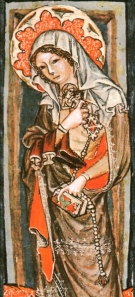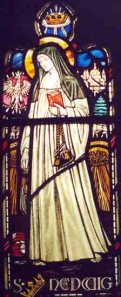Friday 17 October
SAINT LUKE
Evangelist
(Feast)
Evangelist
(Feast)
St. Luke, a physician at Antioch, and a painter, became a convert of St. Paul, and afterwards his fellow-laborer. He is best known to us as the historian of the New Testament. Though not an eye-witness of our Lord's life, the Evangelist diligently gathered information from the lips of the apostles, and wrote, as he tells us, all things in order.
The acts of the Apostles were written by this Evangelist as a sequel to his Gospel, bringing the history .of the Church down to the first imprisonment of St. Paul at Rome. The humble historian never names himself, but by his occasional use of "we" for "they" we are able to detect his presence in the scenes which he describes. We thus find that he sailed with St. Paul and Silas from Troas to Macedonia; stayed behind apparently for seven years at Philippi, and, lastly, shared the shipwreck and perils of the memorable voyage to Rome.
Here his own narrative ends, but from St. Paul's Epistles we learn that St. Luke was his faithful companion to the end. He died a martyr's death some time afterwards in Achaia.
Lives of the Saints, by Alban Butler, Benziger Bros. ed. [1894]
http://www.ibreviary.com/m/breviario.php READINGS
FIRST READINGFrom the Acts of the Apostles
9:27-31; 11:19-26The Church was filled with the consolation of the Holy Spirit
Barnabas took Saul in charge and introduced him to the apostles. He explained to them how on his journey Saul had seen the Lord, who had conversed with him, and how Saul had been speaking out fearlessly in the name of Jesus at Damascus. Saul stayed with them moving freely about Jerusalem, and expressing himself quite openly in the name of the Lord. He even addressed the Greek-speaking Jews and debated with them. They for their part responded by trying to kill him. When the brothers learned of this, some of them took him down to Caesarea and sent him of to Tarsus. .....
RESPONSORY
Acts 12:24; 13:48, 52
The word of the Lord continued to increase and spread everywhere
– and all who were destined for eternal life believed in it.
The disciples were filled with joy and with the Holy Spirit.
– And all who were destined for eternal life believed in it.
SECOND READING
St Greg Great - Typographically
From a homily on the
gospels by Saint Gregory the Great, pope
(Hom
17, 1-3: PL 76, 1139 )
The Lord follows his
preachers
Beloved brothers, our Lord and Saviour sometimes gives us instruction by words and
sometimes by actions. His very deeds are our commands; and whenever he acts
silently he is teaching us what we should do. For example, he sends his
disciples out to preach two by two, because the precept of charity is
twofold—love of God and of one’s neighbour.
The Lord sends his
disciples out to preach in twos in order to teach us silently that whoever
fails in charity toward his neighbour should by no means take upon himself the
office of preaching.
Rightly is it said that he
sent them ahead of him into every city and place
where he himself was to go. For the Lord follows after the preachers,
because preaching goes ahead to prepare the way, and then when the words of
exhortation have gone ahead and established truth in our minds, the Lord comes to live within us. To
those who preach Isaiah says: Prepare the way of the
Lord, make straight the paths of our God. And the psalmist tells them: Make a way for him who rises above the sunset. The
Lord rises above the sunset because from that very place where he slept in
death, he rose again and manifested a greater glory. He rises above the sunset
because in his resurrection he trampled underfoot the death which he endured.
Therefore, we make a way for him who rises above the sunset when
we preach his glory to you, so that when he himself follows after us, he may
illumine you with his love.
Let us listen now to his
words as he sends his preachers forth: The harvest is great but the labourers are few. Pray
therefore the Lord of the harvest to send labourers into his harvest. That
the harvest is good but the labourers are few cannot be said without a heavy
heart, for although there are many to hear the good news there are only a few
to preach it. Indeed, see how full the world is of priests, but yet in God’s
harvest a true labourer is rarely to be found; although we have accepted the
priestly office we do not fulfil its demands.
Think over, my beloved
brothers, think over his words: Pray the Lord of the harvest to send labourers
into his harvest. Pray for us so that we may be able to labour
worthily on your behalf, that our tongue may not grow weary of exhortation,
that after we have taken up the office of preaching our silence may not bring
us condemnation from the just judge.
RESPONSORY
Cf Luke 1:3, 4; Acts 1:1
He carefully traced the whole story from the
beginning and wrote his gospel
– so
that we might understand
the truth of the teaching we had received.
He gave us a record concerning all that Jesus did
and taught.
– So
that we might understand
the truth of the teaching we had received.
St Greg Great - Typographically
From a homily on the
gospels by Saint Gregory the Great, pope
(Hom 17, 1-3: PL 76, 1139 )
The Lord follows his preachers
Beloved brothers, our Lord and Saviour sometimes gives us instruction by words and sometimes by actions. His very deeds are our commands; and whenever he acts silently he is teaching us what we should do. For example, he sends his disciples out to preach two by two, because the precept of charity is twofold—love of God and of one’s neighbour.
(Hom 17, 1-3: PL 76, 1139 )
The Lord follows his preachers
Beloved brothers, our Lord and Saviour sometimes gives us instruction by words and sometimes by actions. His very deeds are our commands; and whenever he acts silently he is teaching us what we should do. For example, he sends his disciples out to preach two by two, because the precept of charity is twofold—love of God and of one’s neighbour.
The Lord sends his
disciples out to preach in twos in order to teach us silently that whoever
fails in charity toward his neighbour should by no means take upon himself the
office of preaching.
Rightly is it said that he
sent them ahead of him into every city and place
where he himself was to go. For the Lord follows after the preachers,
because preaching goes ahead to prepare the way, and then when the words of
exhortation have gone ahead and established truth in our minds, the Lord comes to live within us. To
those who preach Isaiah says: Prepare the way of the
Lord, make straight the paths of our God. And the psalmist tells them: Make a way for him who rises above the sunset. The
Lord rises above the sunset because from that very place where he slept in
death, he rose again and manifested a greater glory. He rises above the sunset
because in his resurrection he trampled underfoot the death which he endured.
Therefore, we make a way for him who rises above the sunset when
we preach his glory to you, so that when he himself follows after us, he may
illumine you with his love.
Let us listen now to his
words as he sends his preachers forth: The harvest is great but the labourers are few. Pray
therefore the Lord of the harvest to send labourers into his harvest. That
the harvest is good but the labourers are few cannot be said without a heavy
heart, for although there are many to hear the good news there are only a few
to preach it. Indeed, see how full the world is of priests, but yet in God’s
harvest a true labourer is rarely to be found; although we have accepted the
priestly office we do not fulfil its demands.
Think over, my beloved
brothers, think over his words: Pray the Lord of the harvest to send labourers
into his harvest. Pray for us so that we may be able to labour
worthily on your behalf, that our tongue may not grow weary of exhortation,
that after we have taken up the office of preaching our silence may not bring
us condemnation from the just judge.
compiled by Felix Just, S.J., Ph.D.
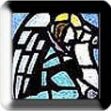 | 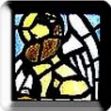 | 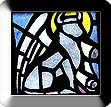 | 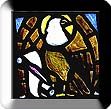 |
| Matthew = Human/Angel | Mark = Lion | Luke = Ox | John = Eagle |
(They are located near the altar of Our Lady of Mercy Parish, Daly City, CA -- used here with permission.)
- Ezekiel 1:1-14 - vision of four heavenly creatures with four faces each: human being, lion, ox, eagle.
- Ezekiel 10:1-22 - throne vision of cherubim with four faces each: cherub, human being, lion, eagle.
- Daniel 7:1-8 - vision of four beasts representing four empires: lion, bear, leopard, a terrible fourth beast with iron teeth and ten horns.
| Early Christian Author | Human/Angel | Lion | Ox | Eagle |
| St. Irenaeus of Lyons | Matthew | John | Luke | Mark |
| St. Augustine of Hippo | Mark | Matthew | Luke | John |
| Pseudo-Athanasius | Matthew | Luke | Mark | John |
| St. Jerome | Matthew | Mark | Luke | John |
The Symbols of all Four Evangelists together:
My Photos:
- Assisi: Basilica of San Francesco: symbols of the Four Evangelists surrounding the rosette window on the main façade
- Florence: Battistero di San Giovanni: symbols of the Four Evanglists on the doors of the Baptistery; others also outside the Orsanmichele



